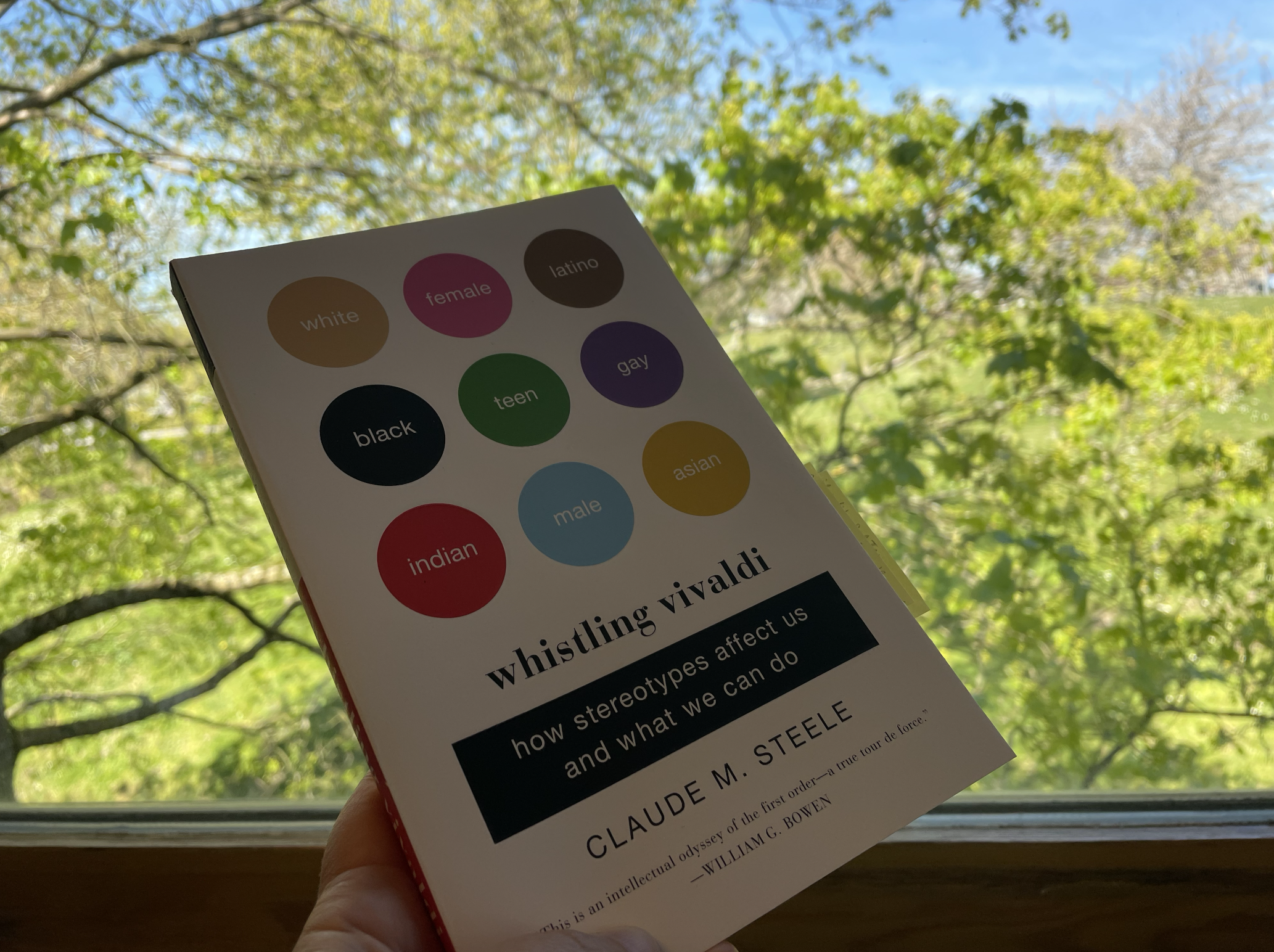
Reminding myself of “Whistling Vivaldi: How stereotypes affect us and what we can do” (Steele, 2011)
As I was gathering my favorite three books on learning and teaching to wave at the participants of our “introduction to teaching and learning” course today, I realized I never summarized one of them: “Whistling Vivaldi: How stereotypes affect us and what we can do” (Steele, 2011), which is what I am doing below. (The other two? “Communities of Practice“, and “Small Teaching“)
Calling this a “summary” might actually be a little risky, since I am basing this on the little sticky notes with keywords in my book, and what I remember from having read it years ago, and writing this while my co-teacher is teaching (sorry, Jonas…). But this is what stuck with me, so here we go anyway!
In a nutshell: Stereotype Threat is the effect of fear of confirming negative stereotypes against your group hindering your performance on specific tasks.
“Against your group” is the tricky part here, because you are of course always parts of multiple groups (“intersectionality”), and group identity can be triggered — or not (as in this example of whether football fans help someone from a different team, or not, being correlated with whether they currently identify as “fan of team x” or “football fan”). If there are negative stereotypes against a facet of your identity that you are currently very much aware of (as in Steele’s examples, often being a Black man in prestigious US universities), you are likely to feel hyper-scrutiny of everybody around you, which might lead to forever proving yourself — spending a lot of energy on not confirming people’s stereotypes against your group, but actually failing to do so because that energy is missing for actually performing the task to the best of your abilities. Sometimes that leads people to “over-efforting” — persisting in order to not confirm stereotypes, past the point of where it would have been smarter to change approach. This is true in academic contexts (whether a test is framed as an intelligence test or just a learning opportunity) but also for example in sports (is it about testing strategical ability, or about being good at sports?).
Interestingly, this effect even works on people from non-historically marginalized minorities: for example white men playing basketball against black men perform worse because now the stereotype is that the white men shouldn’t be as athletic and skilled. And this effect shows up in other situations, too, for example white people sitting further away from Black people or avoiding conversations about race isn’t necessarily based on racism, but based in insecurity of how to behave, i.e. on fear of being seen as racist, thus confirming that stereotype. This is also something I encounter with a very highly esteemed male colleague of mine who avoids conversations about gender because he doesn’t want to be seen as non-feminist, but that’s exactly the impression I now get because he is not even willing to discuss the topics I think should be discussed. Yet if we discuss inclusion without explicitly mentioning gender, there are discussions and they are super constructive.
So as teachers and even more generally as people, our focus should be on reframing conversations and changing the contingencies, i.e. on how much energy people have to spend on protecting their identity vs on learning. Reframing conversations or tasks as learning opportunities rather than as something that surfaces abilities greatly reduces stereotype threat. And if we do have to trigger identities, we should trigger the most inclusive one possible in the context (also for example not “students of a specific study program vs another one” as I often see happening, but rather “students of engineering”, or even better as “learners”).
Another thing we can do is to make sure that minorities have a critical mass so that individuals don’t always have to speak “for all women”, and generally valuing diversity. Or as a majority teacher giving feedback to minority students, making sure to both articulate high standards and belief in the student’s abilities.
I find stereotype threat a really helpful concept to have in mind when teaching, and the book is a really captivating read. The title, “Whistling Vivaldi”, refers to a Black man’s strategy to whistle classical music when walking in dark streets in order to not be perceived as (as much of) a threat — imagine having to spend that much energy to mitigate other people’s perceptions of you constantly, whether in an academic context or the rest of your life, or both. If we can help reducing that burden, why wouldn’t we?
Steele, C. M. (2011). Whistling Vivaldi: How stereotypes affect us and what we can do. New York, NY: WW Norton.
Planning a seminar on relationships in the classroom - Adventures in Oceanography and Teaching says:
[…] …stereotype threat, […]